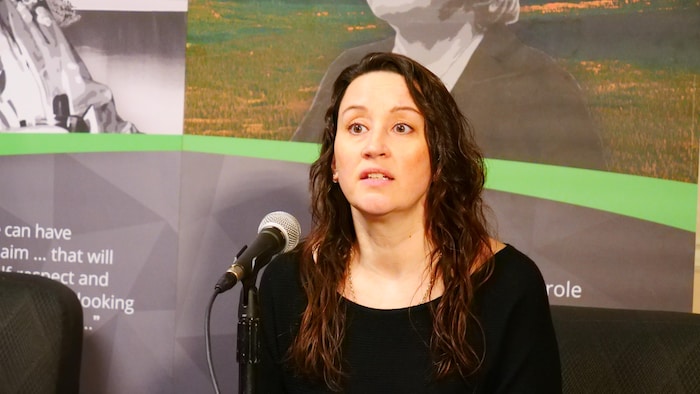Gladue’s principles, established following recommendations by former judge Murray Sinclair, who died earlier this month, are not used in the Northwest Territories, where nearly half the population is Indigenous.
When sentencing an Indigenous offender, most courts across the country take into account their background and circumstances. This information is, most of the time, compiled into a Gladue report.
In the NWT, the pre-sentence report compiles elements of the Gladue principles, an approach that some say may not do justice to Indigenous offenders.
The Northwest Territories certainly isn’t the only jurisdiction that doesn’t prepare Gladue reports, but it’s still surprising when you consider that a large proportion of the population is Indigenous, says criminal lawyer Austin Corbett, who practices law in Alberta and the NWT.
According to a federal government report (New window)89% of offenders in custody in the NWT. are Indigenous. The Indigenous population accounts for 49% in the territory, according to 2021 census data.
In Alberta, criminal lawyers can request a Gladue report, written by an Aboriginal person generally from the same community as the offender.

Open in full screen mode
Criminal lawyer Austin Corbett practices law in Alberta and the NWT.
Photo: Provided by Austin Corbett
I think they are interesting, not only for me or Crown prosecutors, but also for judges to help them understand what might have caused an individual to end up in court for committing a criminal act, adds Austin Corbett.
Pre-sentence reports in the NWT. contain Gladue factors, but are not as detailed as the Gladue reports in Alberta, he continues.
Differences between the two documents
In 2023, Territorial Court Judge Vaughn Myers denied the request for a Gladue report, saying pre-sentence reports compare very favorably to Gladue reports prepared in Alberta.
Lawyer Austin Corbett says one of the challenges is that the authors of these pre-sentence reports are NWT probation officers.
He said an Indigenous offender might not want to be honest with a probation officer because it could lead to a breach of probation and additional charges.
They have the ability to enforce the law. So if we are on probation, and we appear before a probation officer, we will of course fear [de se retrouver en situation] of breach of probation conditions, he said.
The intent of a pre-sentence report also differs. The latter aims to support the court in understanding an offender, whether Aboriginal or not.
Culturally Appropriate Program
In Yukon, the Council of First Nations (CYFN) manages the Gladue reporting program. Following favorable conclusions after a three-year pilot project, this program is now offered on an ongoing basis.
Before the pilot, many First Nations and lawyers prepared Gladue reports in the corner of their desk on an ad hoc basis, explains CYFN Executive Director Shadelle Chambers.
We wanted a formal, culturally appropriate program to be put in place in the Yukon to standardize the standards of practice in the report.
A quote from Shadelle Chambers, Executive Director of the Council of Yukon First Nations
Today, approximately 75 Gladue reports are written each year in Yukon, by seven authors on a rotating basis.

Open in full screen mode
Shadelle Chambers is the Executive Director of the Council of Yukon First Nations.
Photo : Radio-Canada / Claudiane Samson
They don’t need to be prepared by lawyers or government employees like probation officers, she said.
Training for probation officers
The territorial Department of Justice said by email that probation officers in the N.W.T. are properly trained to include Gladue factors in the preparation of their pre-sentence reports.
In the NWT, a specific section of the pre-sentence report refers to factors related to the accused if an Indigenous offender, including residential school heritage, and other contributing circumstances , explains the spokesperson for the Ministry, Thomas Ethier.
Thomas Ethier adds that Gladue reports are sometimes requested by the defense and that Gladue report authors are recruited in certain circumstances.
With information from Jenna Dulewich

